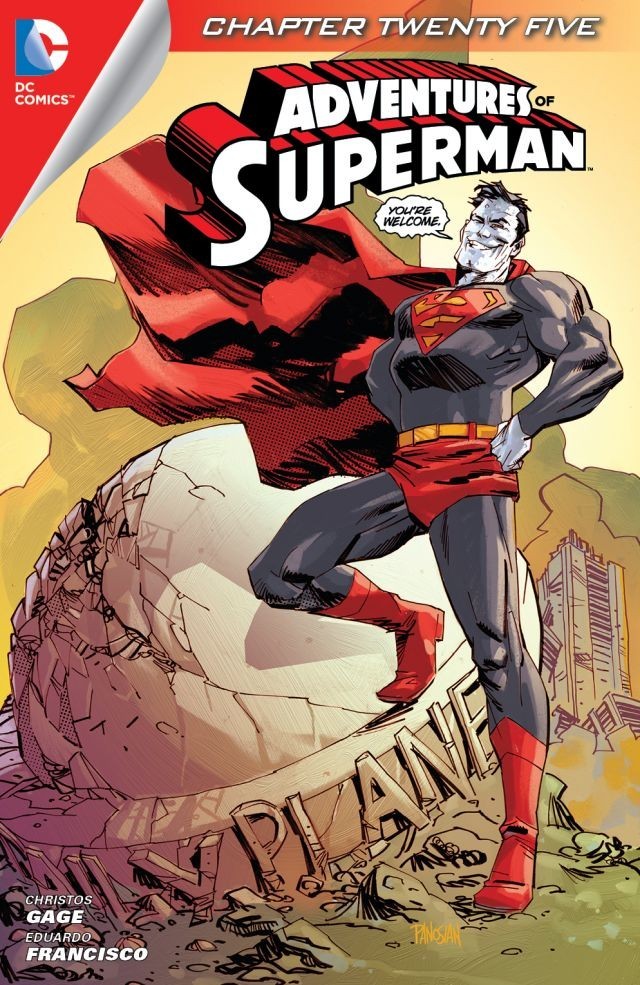Superman is my favorite superhero, possibly my favorite fictional character. But when it comes down to it, my favorite moments in Superman stories rarely involve Superman directly, but instead are about the men, women, and children inspired by Superman to be brave and do the right thing, even at great personal cost. The little boy standing up to his abusive father in Action Comics #0. The population of Earth rising up to face Mageddon the Anti-Sun in JLA #41.
Which is why I love Bizarro so, so much. There are a few characters explicitly inspired to heroics by Superman (Supergirl, Superboy, Steel), but Bizarro is the only one who, by narrative conceit, can never live up to the ideal. Whatever his origin (and there’s been a few), Bizarro’s defining characteristic is that he’s “the imperfect clone of Superman.” He wants to be the hero but he always gets it wrong, often so badly he does the exact opposite of what Superman would do. He even speaks in opposites, replacing “hello” with “goodbye” and “hate” with “love.” This makes Bizarro an extremely versatile character.
Bizarro can be played for laughs. His childlike speech pattern, his unbridled enthusiasm, and his destructive tendencies can create both big slapstick comedy and cutting satire of superheroes, as they do in this brilliant short from DC Nation. Bizarro can be played for horror, as a rampaging, unreasonable monster, as he is in John Byrne’s Man of Steel. Or Bizarro can be a tragic figure, doomed to catch glimpses of the perfect life he was supposed to have, only to fail and fail again, as he does in the moment he realizes he is not and can never be Superman in Superman: the Animated Series (Spoiler, this scene is fucking heartbreaking).
 Which brings us to Adventures of Superman #25-27, just released from DC Digital on Comixology. Adventures of Superman is DC Comics’ digital-first anthology Superman series, where a variety of writers and artists create short, out-of-continuity stories. In practice, this means several “day in the life” stories where Superman still wears red trunks on the outside, and like any anthology the quality varies wildly, but the best of the series has been phenomenal. And issues #25-27, “Flowers for Bizarro” by Christos Gage and Eduardo Francisco, may be the best story yet.
Which brings us to Adventures of Superman #25-27, just released from DC Digital on Comixology. Adventures of Superman is DC Comics’ digital-first anthology Superman series, where a variety of writers and artists create short, out-of-continuity stories. In practice, this means several “day in the life” stories where Superman still wears red trunks on the outside, and like any anthology the quality varies wildly, but the best of the series has been phenomenal. And issues #25-27, “Flowers for Bizarro” by Christos Gage and Eduardo Francisco, may be the best story yet.
Anyone familiar with Daniel Keyes’ classic short story “Flowers for Algernon” can guess the basic plot arc: scientist Emil Hamilton makes Bizarro smarter, so he can now talk, think, and act in a straightforward, reliable manner as a second Superman. But the public isn’t ready to accept the chalky skinned Bizarro as a hero, and then the treatment starts to wear off. However, the story resolves in a way I did not see coming, one that is both more hopeful and more tragic than a simple reversion to the status quo.
There’s a lot of great ideas in the story. For one, Hamilton posits that being Superman’s opposite is not a symptom of Bizarro’s madness, but a coping mechanism. Bizarro’s brain cannot make sense of the world, so acting like Superman, even in reverse, gives Bizarro’s life structure. Again, the idea of trying to be Superman, even in failure, saves Bizarro.
But there’s the dark side too. Increasing Bizarro’s intelligence makes him safer for the public, but it makes Bizarro that much more aware of all the ways he is not Superman, the person he was literally created to replace. Not only will Bizarro never look like Superman or be loved like Superman, he will never have Superman’s family and friends, or memories of growing up and living a normal life as Clark Kent.
Understanding his existential failure makes Bizarro sad and angry, and reverting to his dumber, more blissful self could seem like a blessing. But it’s not. It’s the easy way out, the coward’s way out. It’s suicide. Even when he’s smarter, Bizarro still acts in unSuperman-like ways. He’s insecure, he’s callous, and he’s afraid of people and of himself. But Superman won’t give up on Bizarro, or let Bizarro give up on himself.
Bizarro shows us everything Superman isn’t, which helps define who Superman actually is. That Bizarro wants to be good, and tries to follow Superman’s example, makes him endearing. When Superman arrives to save the day, we’re fairly sure he’ll succeed and we’re certain he’ll survive. When Bizarro arrives, we’re certain he’ll fail, and his survival is kinda iffy. That’s what makes it so much more surprising, uplifting, and satisfying when Bizarro wins.
Steven Padnick is a freelance writer and editor. By day. You can find more of his writing and funny pictures at padnick.tumblr.com.









